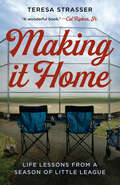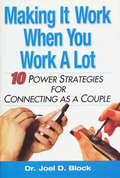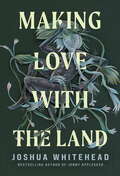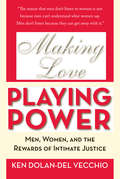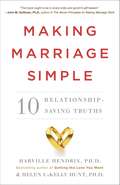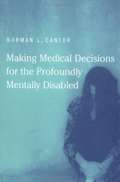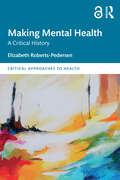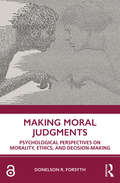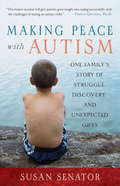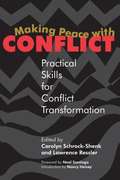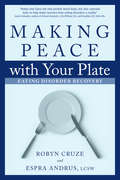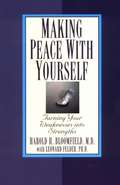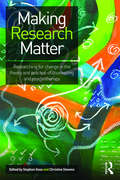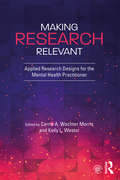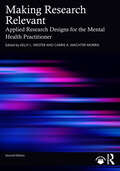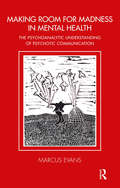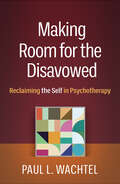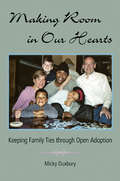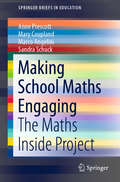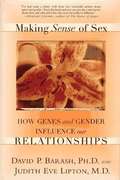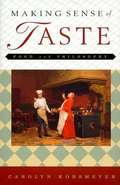- Table View
- List View
Making It Home: Life Lessons from a Season of Little League
by Teresa StrasserAn achingly heartfelt and surprisingly funny memoir about family, grief, and moving forward by an award-winning writer and TV personality. When her brother dies from cancer, and then her mother just four months later, Teresa Strasser has no one to mourn with but her irresponsible, cantankerous, trailerpark-dwelling father. He claims not to remember her chaotic childhood, but he&’s a devoted grandpa, so as her son embarks on his first season pitching in Little League, Teresa and Nelson form a grief group of two in beach chairs lined up behind the first base line. There are no therapeutically trained facilitators and no rules other than those dictated by the Little League of America, and the human heart. For Teresa and her father, the stages of grief are the draft, the regular season, and the playoffs. One season of baseball becomes the framework for a memoir about family, loss, and the fundamentals of baseball and life. They cheer, talk smack about other teams, scream at each other in the parking lot, and care way too much about Little League. Making It Home is a bracingly honest journey through grief, self-doubt, and anxiety armed with humor and optimism. After all, America&’s pastime may be just a game, but it always leaves room for redemption, even at the bottom of the lineup.
Making It Work When You Work A Lot: 10 Power Strategies For Connecting As A Couple
by Joel D. BlockA sampling of real-life stories behind the curtain in the executive suite: Marion has a ten-percent marriage. Her husband is on the road eighty percent of the time and catches up on sleep half of the time he is at home. She uses innovative techniques to save her relationship. The neglect and resentment Joyce felt as a result of her husband Paul's extraordinary work schedule was temporarily eased by her fling with a former colleague. She confessed her infidelity to Paul--and they're still together! Learn about repair strategies that are tried and proven. Rob, a stay-at-home dad, also considered having an affair. He's come up with a better solution, one that saved his marriage as well as his ego. Kevin had developed an intriguing method for keeping Janice at a distance. We'll see how Janice reacted and what they did to bring value back to their relationship. Alex badgered Florence about her housekeeping, then acknowledged that his beef was Florence's meteoric career progression, especially since his career had stalled. Unlike many other couples where the wife is the bigger earner, Florence and Alex worked things out brilliantly. These successful couples have confronted--and overcome--the considerable challenges of balancing work and home life by focusing on the bottom line: strategies for maintaining the vitality, energy, and love that first brought them together. In this groundbreaking guide, relationship specialist Dr. Joel Block will show you what they did, how they did it, and how you can, too. Let this book be your portable relationship coach--the ultimate resource for Making It Work When You Work a Lot. Dr. Joel Block is a clinical psychologist specializing in couples therapy. His success in treating hundreds of devastated executive marriages over the years has led him to formulate a blueprint for success that addresses the challenges that are unique to these relationships. Making It Work When You Work a Lot is a real-life action plan with the mission of protecting executive marriages. It was formulated after interviews with nearly one hundred executives and their spouses, men and women from across the country. Each chapter is derived from the specific concerns of executives struggling to make their marriages work. As you will discover, the issues they raised involve competencies that are also crucial in the world of business. Dr. Block shows you how solutions to problems encountered in the workplace translate directly to successful resolutions of similar challenges at home: 1.
Making Love Just: Sexual Ethics For Perplexing Times
by Marvin M. EllisonEthical reflection about sexuality is increasingly controversial, complex, and conflicted. After centuries of conflicting messages from the tradition, Christians are understandably confused about how exactly the good news pertains to sexuality. Using a series of provocative questions, Marvin Ellison, a pioneer in contemporary Christian rethinking of sexuality and sexual ethics, attempts to increase readers' skills and confidence for engaging in ethical deliberation about sexuality. Redrawing the conventional, rule-based sexual morality, often rigidly and legalistically applied or broadly ignored, entails transcending fear and shame to redraw the sexual map, he argues. Ellison works to affirm a more relationally focused ethical framework, from which to deliberate about premarital and extramarital sex, marriage and divorce, homosexuality, contraception, abortion, spousal abuse, and sex-education. Students and all adults will welcome this book for enabling their personal clarity, approach to relationships, and mindful participation in respectful moral debate.
Making Love with the Land: Essays
by Joshua WhiteheadA moving and deeply personal excavation of Indigenous beauty and passion in a suffering world The novel Jonny Appleseed established Joshua Whitehead as one of the most exciting and important new literary voices on Turtle Island, winning both a Lambda Literary Award and Canada Reads 2021. In Making Love with the Land, his first nonfiction book, Whitehead explores the relationships between body, language, and land through creative essay, memoir, and confession.In prose that is evocative and sensual, unabashedly queer and visceral, raw and autobiographical, Whitehead writes of an Indigenous body in pain, coping with trauma. Deeply rooted within, he reaches across the anguish to create a new form of storytelling he calls &“biostory&”—beyond genre, and entirely sovereign. Through this narrative perspective, Making Love with the Land recasts mental health struggles and our complex emotional landscapes from a nefarious parasite on his (and our) well-being to kin, even a relation, no matter what difficulties they present to us. Whitehead ruminates on loss and pain without shame or ridicule but rather highlights waypoints for personal transformation. Written in the aftermath of heartbreak, before and during the pandemic, Making Love with the Land illuminates this present moment in which both Indigenous and non-Indigenous people are rediscovering old ways and creating new ones about connection with and responsibility toward each other and the land.Intellectually audacious and emotionally compelling, Whitehead shares his devotion to the world in which we live and brilliantly—even joyfully—maps his experience on the land that has shaped stories, histories, and bodies from time immemorial.
Making Love, Playing Power: Men, Women, and the Rewards of Intimate Justice
by Ken Dolan-Del VecchioMaking Love, Playing Power: Men, Women, and the Rewards of Intimate Justice brings the cutting edge of relationship therapy to the mass market. Family therapist and organizational consultant Ken Dolan-Del Vecchio debunks superficial theories about communication styles and gender roles as he gets to the real reason so many relationships are in trouble - misuse of power. Making Love, Playing Power reveals how gender, race, sexual orientation, and money set the foundation for personal power, and how power as domination drives most conflicts whether between nations, interest groups, or individuals. Women will find Making Love, Playing Power uniquely inspiring and validating. Men will find it life-changing. This book shows how to reject the power of domination and realize the power of love. Dolan-Del Vecchio offers new and provocative "principles of love,” memorable case examples, and "action steps” that help readers make changes that bring lasting love.
Making Marriage Simple: Ten Relationship-Saving Truths
by Harville Hendrix Helen Lakelly HuntChange the relationship you have into the one you want.Welcome to the Relationship Revolution! Making Marriage Simple is the accessible, essential road map to building a strong marriage in the modern world. Bestselling authors Harville Hendrix and Helen LaKelly Hunt distill into ten essential truths what they've learned about how to create a successful and satisfying relationship--both from their decades of "R&D" in the marriage lab of their workshops, and from their own relationship journey. In each chapter, Harville and Helen introduce a simple truth--such as "a frustration is a wish in disguise," "incompatibility is grounds for marriage," or "conflict is growth trying to happen"--and then walk couples through easy yet effective exercises to help them apply each truth in real life, every day. Harville and Helen have spent their careers helping couples transform their marriages through research, workshops, and counseling. But marriage--even for marriage experts--is never easy, and a number of years ago they found themselves on the brink of divorce. Harville and Helen put themselves back through the exercises they'd coached so many other couples through, saving their marriage and helping them achieve a true partnership.This book is for all couples. It offers the practical tools needed to transform one's relationship into a rewarding and joyous marriage. Written with humor, compassion, and honesty, and illustrated throughout with engaging line drawings, Making Marriage Simple is a strategic blueprint for creating a stronger, more satisfying partnership in today's world.
Making Medical Decisions for the Profoundly Mentally Disabled
by Norman L. CantorNorman Cantor analyzes the legal and moral status of people with profound mental disabilities -- those with extreme cognitive impairments that prevent their exercise of medical self-determination. He proposes a legal and moral framework for surrogate medical decision making on their behalf. The issues Cantor explores will be of interest to professionals in law, medicine, psychology, philosophy, and ethics, as well as to parents, guardians, and health care providers who face perplexing issues in the context of surrogate medical decision making. The profoundly mentally disabled are thought by some moral philosophers to lack the minimum cognitive ability for personhood. Countering this position, Cantor advances both theoretical and practical arguments for according them full legal and moral status. He also argues that the concept of intrinsic human dignity should have an integral role in shaping the bounds of surrogate decision making. Thus, he claims, while profoundly mentally disabled persons are not entitled to make their own medical decisions, respect for intrinsic human dignity dictates their right to have a conscientious surrogate make medical decisions on their behalf. Cantor discusses the criteria that bind such surrogates. He asserts, contrary to popular wisdom, that the best interests of the disabled person are not always the determinative standard: the interests of family or others can sometimes be considered. Surrogates may even, consistent with the intrinsic human dignity standard, sometimes authorize tissue donation or participation in non-therapeutic medical research by profoundly disabled persons. Intrinsic human dignity limits the occasions for such decisions and dictates close attention to the preferences and feelings of the profoundly disabled persons themselves. Cantor also analyzes the underlying philosophical rationale that makes these decision-making criteria consistent with law and morals.
Making Mental Health: A Critical History (Critical Approaches to Health)
by Elizabeth Roberts-PedersenMaking Mental Health: A Critical History historicises mental health by examining the concept from the ‘madness’ of the late nineteenth century to the changing ideas about its contemporary concerns and status. It argues that a critical approach to the history of psychiatry and mental health shows them to constitute a dual clinical-political project that gathered pace over the course of the twentieth century and continues to resonate in the present. Drawing on scholarship across several areas of historical inquiry as well as historical and contemporary clinical literature, the book uses a thematic approach to highlight decisive moments that demonstrate the stakes of this engagement in Anglo-American contexts.By tracing the (unfinished) history of institutions, the search for cures for psychiatric distress, the growing interest of the nation-state in mental health, the history of attempts to globalise psychiatry, the controversies over the politics of diagnostic categories that erupted in the 1960s and 1970s, and the history of theorising about the relationship between the psyche and the market, the book offers a comprehensive account of the evolution of mental health into a commonplace concern.Addressing key questions in the fields of history, medical humanities, and the social sciences, as well as in the psychiatry disciplines themselves, the book is an essential contribution to an ongoing conversation about mental distress and its meanings.The Open Access version of this book, available at http://www.taylorfrancis.com, has been made available under a Creative Commons Attribution-Non Commercial-No Derivatives (CC-BY-NC-ND) 4.0 license.
Making Moral Judgments: Psychological Perspectives on Morality, Ethics, and Decision-Making
by Donelson ForsythThis fascinating new book examines diversity in moral judgements, drawing on recent work in social, personality, and evolutionary psychology, reviewing the factors that influence the moral judgments people make. Why do reasonable people so often disagree when drawing distinctions between what is morally right and wrong? Even when individuals agree in their moral pronouncements, they may employ different standards, different comparative processes, or entirely disparate criteria in their judgments. Examining the sources of this variety, the author expertly explores morality using ethics position theory, alongside other theoretical perspectives in moral psychology, and shows how it can relate to contemporary social issues from abortion to premarital sex to human rights. Also featuring a chapter on applied contexts, using the theory of ethics positions to gain insights into the moral choices and actions of individuals, groups, and organizations in educational, research, political, medical, and business settings, the book offers answers that apply across individuals, communities, and cultures. Investigating the relationship between people’s personal moral philosophies and their ethical thoughts, emotions, and actions, this is fascinating reading for students and academics from psychology and philosophy and anyone interested in morality and ethics.
Making Peace With Chronic Pain: A Whole-Life Strategy
by Marlene E. HunterPublished in 1996, Making Peace With Chronic Pain is a valuable contribution to the field of Psychiatry/Clinical Psychology.
Making Peace with Autism: One Family's Story of Struggle, Discovery, and Unexpected Gifts
by Susan SenatorReceiving a diagnosis of autism is a major crisis for parents and families, who often feel as if their world has come to an end. In this insightful narrative, a courageous and inspiring mother explains why a diagnosis of autism doesn't have to shatter a family's dreams of happiness. Senator offers the hard-won, in-the-trenches wisdom of someone who's been there and is still there today--and she demonstrates how families can find courage, contentment, and connection in the shadow of autism.In Making Peace with Autism, Susan Senator describes her own journey raising a child with a severe autism spectrum disorder, along with two other typically developing boys. Without offering a miracle treatment or cure, Senator offers valuable strategies for coping successfully with the daily struggles of life with an autistic child.Along the way she models the combination of stamina and courage, openness, and humor that has helped her family to survive--and even to thrive. Topics include: the agony of diagnosis, grieving and acceptance, finding the right school program, helping siblings with their struggles and concerns, having fun together, and keeping the marriage strong.
Making Peace with Conflict: Practical Skills for Conflict Transformation
by Carolyn Schrock-Shenk; Lawrence ResslerFoundations of Conflict Transformation Communication and Conflict Transformation Struggling with the Tension Power in Conflict Transformation Application of Conflict Transformation
Making Peace with Your Parents: The Key to Enriching Your Life and All Your Relationships
by Harold Bloomfield Leonard FelderNo matter how old you are and whether or not your parents are alive, you have to come to terms with them. This wise and practical book will show you how to deal with the most fundamental relationships in your life and, in the process, become the happy, creative, and fulfilled person you are meant to be.
Making Peace with Your Plate
by Robyn Cruze Espra AndrusAnorexia has the highest mortality rate of any mental illness. Binge-eating disorder (BED) and bulimia can also bring misery and death. Pushing the River, with its unique three-phase approach to eating, smashes the illusion of control, the power, and the lies of this deadly illness, providing a concrete plan for long-term recovery from the disease of disordered eating.
Making Peace with Yourself
by Harold Bloomfield M.D."I'm afraid of getting again.""When I look in the mirror, I'm never quite satisfied.""I can't stand criticism.""I'm always feeling tense and rushed.""I wish I could be happier."Do any of these sound familiar?Aren't they exactly the kinds of weaknesses that keep us from enjoying our lives to the fullest?This wise and compassionate book can help you confront these problems, perhaps for the first time in your life.Through a series of exercises, case studies, and personal growth techniques, you'll learn to analyze your weakness and, most importantly, strip it of the power it has over you.Making Peace with Yourself is one of life's toughest challenges, but the rewards will be tremendous.
Making Psychotherapy More Effective with Unconscious Process Work
by Dan N ShortMaking Psychotherapy More Effective with Unconscious Process Work is an essential text that seeks to educate readers on the astounding capabilities of unconscious intelligence to both gather information and engage in rapid cognition. By providing a comprehensive and easily understood overview of the recent research on unconscious processes, as well as clinical case material, this book provides readers with skills that will enable them to strategically engage these resources. The first part of the book discusses the research-based principles that frame this growth-oriented approach towards psychotherapy. New discoveries about the surprising limitations of conscious self-governance force readers to reconsider the overall aim of psychotherapy. The second part explores several transtheoretical techniques, focusing on prediction, reimagining, mental contrasting, and incubated cognition. Case examples and key point summaries are used throughout, with the last chapter featuring reflective exercises. This book is essential reading for practicing psychotherapists, Ericksonian therapists, graduate students, and professors of psychotherapy.
Making Research Matter: Researching for change in the theory and practice of counselling and psychotherapy
by Stephen Goss Christine StevensMaking Research Matter is an original contribution to the growing field of work-based learning with a focus on research aimed at developing the practice of counselling and psychotherapy addressing the practice-research gap. Stephen Goss, Christine Stevens and their contributors explore the links between research and professional practice and show how this can impact on practice to make a genuine, demonstrable contribution to the development of therapeutic services, good practice and the understanding of psychological and social issues. The book is divided into two parts. Part one gives an account of the thinking, ethos and development of work-based learning. It explores the importance of the in-depth rigorous and reflexive inquiry skills needed to sustain research project work. Part two presents nine studies of work-based psychotherapy or counselling related research. Each account sets out the focus and motivation of the study and critically discusses how the research design was developed, the choice of methods employed, with an explanation of the outcomes. A vital part of each account is a review of how the research has been used to make changes and developments in the work setting. Making Research Matter provides insights into the lived experience of the practitioner-researcher, to stimulate the reader to generate their own ideas for research enquiry. It presents a range of proven, successful research projects, and shows how they have made a difference in the development of theory and practice which lead to positive change, better services and more informed practice. It will be an essential resource for psychotherapists, counsellors, social workers, and those involved in coaching and clinical psychology.
Making Research Relevant: Applied Research Designs for the Mental Health Practitioner
by Carrie A. Wachter Morris Kelly L. WesterMaking Research Relevant is the ideal core textbook for master’s-level introduction to research methods courses in mental health. Accessible and user friendly, it is designed to help trainees and practitioners understand, connect, and apply research to clinical practice and day-to-day work with students and clients. The text covers foundational concepts like research ethics and how to best consume research, as well as 11 applied, evaluative, and outcome-based research methods. Easy-to-read chapters are infused with case examples from diverse settings and paired with brief video lectures, which provide vignettes to guide application and visual components that demonstrate how research methods can benefit mental health practitioners in real-world scenarios.
Making Research Relevant: Applied Research Designs for the Mental Health Practitioner
by Carrie A. Wachter Morris Kelly L. WesterMaking Research Relevant is the ideal core textbook for master’s-level introduction to research methods courses in any mental health field. Accessible and user friendly, it is designed to help trainees and practitioners understand, connect, and apply research to clinical practice and day-to-day work with students and clients.The text covers foundational concepts, such as research ethics, the consumption of research, and how to analyze data, as well as an additional 11 applied, evaluative, and outcome-based research methods that can be applied in practice. Easy to read, conversational chapters are infused with case examples from diverse settings, paired with brief video lectures and a practice-based application section which provide vignettes and practice to guide application and visual components that demonstrate how research methods can benefit mental health practitioners in real-world scenarios.
Making Room for Madness in Mental Health: The Psychoanalytic Understanding of Psychotic Communication (Tavistock Clinic Series)
by Marcus EvansIn this book, the author argues that in addition to providing a helpful treatment for patients who suffer from serious psychological difficulties, psychoanalytic thinking can also help mental health staff develop a better understanding of their patients and complement other ways of thinking about mental disturbance. Mental health professionals need to be receptive to their patients' projections and communications, but these powerful projections can become overwhelming, especially for clinicians who are in direct contact with their patients for long periods of time. A psychoanalytic model which puts the understanding of the relationship between the clinician and patient at the centre of its preoccupations can also give mental health professionals a language for describing their experiences of, and interactions with, their patients. This model is developmental and provides a dynamic picture of the ways in which different parts of the patient's self wrestle for control of the patient's mind over time. The author argues that this framework for understanding can help in the day-to-day management of these changes and fluctuations.
Making Room for the Disavowed: Reclaiming the Self in Psychotherapy
by Paul L. WachtelIn this uniquely integrative book, Paul L. Wachtel describes powerful clinical strategies to make room for aspects of the self that were sidetracked in the course of development. Wachtel explores how early attachment experiences can lead people to turn away from certain thoughts and feelings, building a sense of self and ways of interacting on only a limited range of adaptive resources. His approach draws on psychodynamic, humanistic, systemic, and acceptance-centered cognitive-behavioral perspectives, as well as attention to the impact of race, class, and culture. Filled with rich case material, the book illuminates how a therapeutic approach anchored in the present can help heal the wounds of the past.
Making Room in Our Hearts: Keeping Family Ties through Open Adoption
by Micky DuxburyAdopted persons face challenges their entire lives as they struggle to answer the most basic question: Who am I? The hope of open adoption is that adopted children will develop stronger identities if they have the opportunity to develop healthy ongoing relationships with their families of origin. Making Room in Our Hearts offers an intimate look at how these relationships evolve over time, with real-life stories from families who have experienced open adoption first-hand. This book helps both adoptive and birth parents address their fears and concerns, while offering them the support to put the child’s psychological and spiritual needs at the center of adoption. Based on interviews with more than one hundred adopted children, birth and adoptive parents, extended families, professionals and experts, the book is an effective and invaluable resource for those considering open adoption, those experiencing it, and professionals in the field. Openness has altered the landscape of adoption, and Making Room in Our Hearts will help us catch up to the reality that is open adoption today.
Making School Maths Engaging: The Maths Inside Project (SpringerBriefs in Education)
by Anne Prescott Mary Coupland Marco Angelini Sandra SchuckThis book provides an account of a large-scale, national STEM initiative in Australia, the Maths Inside Project, which is designed to increase secondary school students’ engagement and participation in mathematics. The project’s modules include videos illustrating how scientists use mathematics to find solutions to real-world problems, as well as themed activities linked to the school curriculum for mathematics.Outlining the current debates concerning mathematics education in Australia and beyond, the book describes the development and implementation of the modules to guide their use by teachers in year 8-12 Australian mathematics classrooms. It concludes with a discussion of the research, showing how the project increased student engagement. The book discusses the partners involved in the project, including scientists, a national mathematics teachers’ association and the authors’ university. It also offers insights into how to embark on pedagogical improvement through collaboration between individual institutional stakeholders. Providing details of the modules to enable teachers and teacher educators to help their students better understand and utilise the curriculum resources of Maths Inside, the book is a useful resource for educators around the globe wanting to make mathematics engaging, topical and relevant for secondary school students.
Making Sense Of Sex: How Genes And Gender Influence Our Relationships
by David P. Barash Judith Eve LiptonWhy do most women prefer romance, and men, sex? Why do women live longer than men? Why are men willing to pay for sex while women almost never are? Why are women nearly always the primary caregivers of young children? What happens when a man's brain is trapped in a woman's body? When is a short, balding middle-aged man more attractive than a tall, handsome, young one? In Making Sense of Sex, the husband-and-wife team of David Barash, an evolutionary biologist, and Judith Lipton, a clinical psychiatrist, draw on their respective areas of expertise to explore and explain the central fact of our existence -- that men and women are fundamentally, unalterably different. They present an eye-opening and wide-ranging consideration of what those differences are, how they came to be, why they are important, and what they mean in our everyday lives. The authors integrate biological and anthropological findings with real-life stories of indviduals to address the conundrums that surround male-female behavior and relationships. Drawing on the latest research in evolutionary biology, they trace the multifaceted gender gap to the basic, defining difference between males and females: that one makes sperm, the other, eggs. They show how that distinction explains why women and men differ in essential ways, exploring such questions as: Why are men more attracted than women to pornography, group sex, and one-night stands? Why are women the "gatekeepers" of sex? Why do women have orgasms?Making Sense of Sex is a highly informative and entertaining look at human relationships. The book will help readers not only to better understand themselves, but to better understand their children, their relatives, and their lovers with whom they share so much yet find so infuriatingly and fascinatingly different.
Making Sense Of Taste
by Carolyn KorsmeyerKorsmeyer (philosophy, State U. of New York-Buffalo) disagrees with the centuries of philosophers before her that taste is beneath the dignity of the field. She explores how it gained such a low esteem, parallels between notions of aesthetic and gustatory taste, how the sense works scientifically, the multiple components of the experience, its various meanings in art and literature, and its sacred dimension. Annotation copyrighted by Book News, Inc. , Portland, OR
